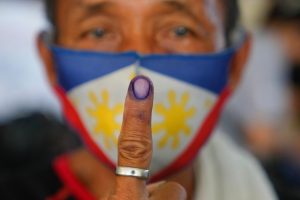Tens of millions of Filipinos are lining up today at polling stations across the country to choose who will succeed President Rodrigo Duterte as president of the Philippines, with is likely to see the rehabilitation of the Marcos family, nearly four decades after Ferdinand E. Marcos was driven into exile in an army-backed popular uprising.
Over the course of the three-month campaign, the race has narrowed down to a final sprint between Vice President Leni Robredo against former senator and congressman Ferdinand Marcos Jr, the son and namesake of the dictator ousted in a popular uprising in 1986. Eight other candidates, including former boxing star Manny Pacquiao, Manila Mayor Isko Moreno, and former national police chief Panfilo Lacson lag far behind Marcos and Robredo in the polls.
Marcos Jr. arrives at election day with an apparently insurmountable lead. The latest Pulse Asia voter preference survey, which was conducted in April 16-21 and released last week, showed Marcos commanding the support of 56 percent of respondents, 33 points ahead of his closest rival, a margin that was virtually unchanged from the previous month’s survey.
The past few days have seen a series of culminating campaign rallies in which the 64-year-old Marcos and his running mate, Sara Duterte-Carpio, the mayor of the southern Philippine city of Davao City and the daughter of outgoing President Rodrigo Duterte, have been treated to rock star-like reception from swarms of supporters. The pair, under the “UniTeam” ticket, have eschewed policy promises for feel-good slogans promising national unity. At a rally on Saturday, Reuters reported, he told hundreds of thousands of supporters that he dreamed of a “victory of unity of the entire Philippines.”
If Marcos wins by the landslide that voter preference surveys seem to suggest, it will mark the dizzying culmination of a years-long campaign by the family to reestablish itself after its shameful exile in the wake of the People Power uprising. During the two-decade-long “conjugal dictatorship” of Ferdinand and his wife Imelda, thousands of people were killed and tortured, especially during Martial Law from 1972 to 1986, while the Marcos family was accused of creaming off billions from the state coffers, which the Philippine government is still attempting to track down.
The uprising of the latter year sent the Marcoses into exile in the United States, where Ferdinand Sr. died three years later. But since the early 1990s, the family has steadily rebuilt its political power. Imelda has twice unsuccessfully attempted to retake the seat of power after returning with her children from the family’s American exile, while Marcos Jr. has developed a political career. Since 1997, he has successfully been elected governor, congressman, and senator as well as running unsuccessfully in 2016 for the vice presidency as Duterte’s running mate.
The specter of a Marcos returning to the presidency, and whitewashing the family’s legacy, has fueled the campaign of second-placed candidate Vice President Leni Robredo, who as an economics student at the University of the Philippines in the 1980s, joined the massive protests that led to the overthrow of Marcos Sr.
Robredo’s campaign has gathered steam across the three-month campaign period – Pulse Asia surveys conducted in mid-March saw her gain 15 percent on Marcos compared to the previous month – has been assisted by a surge of volunteerism among young Filipinos, who have turned out in huge numbers to greet her across the archipelago. But given the gulf separating her from Marcos, a massive late surge in support or record low turnout are the only means by which Robredo can win the presidency.
The impending return of the Marcos dynasty to the national political stage speaks to the continuing deep political divisions in the Philippines, which President Duterte also manipulated on his surprising march to Malacañang in 2016. As the leading political commentator Richard Javad Heydarian told Reuters, “The stakes are higher than any other election in recent years, with Marcos likely to overhaul the constitution to entrench his power if he wins, and Robredo in a position to prevent a Marcosian hegemony.”
The Philippines is just one of many democracies where widespread disaffection about political elites has prompted a populist backlash by those who feel that the promises of democracy have fallen far short of the realities of poverty and inequality that so many still experience.
The pervasive use of social media – the Philippines has the third-largest population of Facebook users in Asia, and the fifth-largest in the world – has also allowed coordinated disinformation campaigns to play their role in the three-month campaign period.
In particular, this campaign has enabled the Marcos campaign to defend the legacy of Marcos père and convert his 1965-86 rule from a byword for unaccountability, corruption, and political repression into an era of stability, economic advancement, and forward-looking optimism. Yet as I’ve argued before, disinformation is only part of the story, and treating it as the central factor in the Marcos resurgence runs the risk of avoiding the less comfortable question of why so many Filipinos are susceptible to such appeals in the first place. No doubt many such questions will be asked and pondered if, as expected the younger Marcos succeeds his father as president.

































